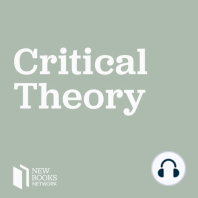71 min listen

Benjamin L. McKean, "Disorienting Neoliberalism: Global Justice and the Outer Limit of Freedom" (Oxford UP, 2020)
Benjamin L. McKean, "Disorienting Neoliberalism: Global Justice and the Outer Limit of Freedom" (Oxford UP, 2020)
ratings:
Length:
48 minutes
Released:
Mar 18, 2021
Format:
Podcast episode
Description
Disorienting Neoliberalism: Global Justice and the Outer Limit of Freedom (Oxford UP, 2020) takes on a number of different dimensions of neoliberalism to help readers consider not only how this ideological framework structures our lives, but also to lead us towards the capacity to reorient our thinking and understanding of the world, and politics. Benjamin McKean explores the way that we can try to see beyond the operational framing that neoliberalism provides in order to prompt readers, and, more specifically, political theorists, to a kind of activism.
McKean’s thesis compels us to think about our political and economic situations in a broader, global perspective, as our consumer experiences are, in fact, global in nature and operation. Disorienting Neoliberalism demystifies the bewildering transnational components of the commodities we interact with on a daily basis, unpacking the way that the transnational supply chain for our goods and services obscures the exploitation and violence inherent in the production of these goods. Because of the promise of freedom through the market as a key attraction for neoliberal thinking, McKean also investigates how much freedom individuals actually have if their entire orientation – in politics and economics – is framed by neoliberalism. We are made to feel powerful as consumers in the market since we can make choices and experience a kind of freedom in this context. But this is based on the conception that the market itself is out of our control and is, itself, disorienting. Thus, we need to reconsider what we think about as our real, actual freedom and how this is contextualized by our experiences and environments. McKean’s analysis asks the reader to try to consider how our freedom is constrained within neoliberalism, and what it is that we need to do to reorient our thinking and our actions to move beyond this framework.
Lilly J. Goren is professor of political science at Carroll University in Waukesha, WI. She is co-editor of the award winning book, Women and the White House: Gender, Popular Culture, and Presidential Politics (University Press of Kentucky, 2012), as well as co-editor of Mad Men and Politics: Nostalgia and the Remaking of Modern America (Bloomsbury Academic, 2015). Email her comments at lgoren@carrollu.edu or tweet to @gorenlj.
Learn more about your ad choices. Visit megaphone.fm/adchoices
Support our show by becoming a premium member! https://newbooksnetwork.supportingcast.fm/critical-theory
McKean’s thesis compels us to think about our political and economic situations in a broader, global perspective, as our consumer experiences are, in fact, global in nature and operation. Disorienting Neoliberalism demystifies the bewildering transnational components of the commodities we interact with on a daily basis, unpacking the way that the transnational supply chain for our goods and services obscures the exploitation and violence inherent in the production of these goods. Because of the promise of freedom through the market as a key attraction for neoliberal thinking, McKean also investigates how much freedom individuals actually have if their entire orientation – in politics and economics – is framed by neoliberalism. We are made to feel powerful as consumers in the market since we can make choices and experience a kind of freedom in this context. But this is based on the conception that the market itself is out of our control and is, itself, disorienting. Thus, we need to reconsider what we think about as our real, actual freedom and how this is contextualized by our experiences and environments. McKean’s analysis asks the reader to try to consider how our freedom is constrained within neoliberalism, and what it is that we need to do to reorient our thinking and our actions to move beyond this framework.
Lilly J. Goren is professor of political science at Carroll University in Waukesha, WI. She is co-editor of the award winning book, Women and the White House: Gender, Popular Culture, and Presidential Politics (University Press of Kentucky, 2012), as well as co-editor of Mad Men and Politics: Nostalgia and the Remaking of Modern America (Bloomsbury Academic, 2015). Email her comments at lgoren@carrollu.edu or tweet to @gorenlj.
Learn more about your ad choices. Visit megaphone.fm/adchoices
Support our show by becoming a premium member! https://newbooksnetwork.supportingcast.fm/critical-theory
Released:
Mar 18, 2021
Format:
Podcast episode
Titles in the series (100)
John H. Summers, “Every Fury on Earth” (Davies Group, 2008): The vast majority of historians write history. Perhaps that’s good, as one should stick to what one knows. But there are historians who braves the waters of social and political criticism. One thinks of Arthur Schelsinger Jr., Richard Hofstadter, by New Books in Critical Theory